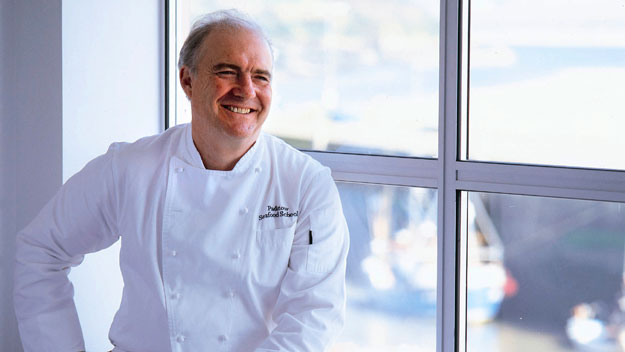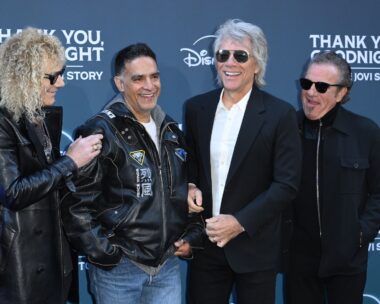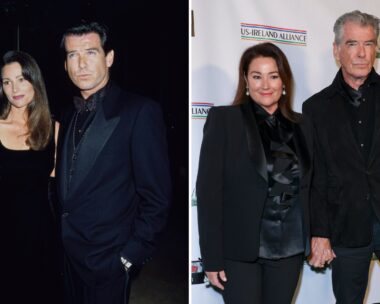Rick Stein might be one of the world’s most famous chefs, but when his children were younger, they far preferred fast food to his cooking.
Rick has three sons, Edward, 30, Jack, 28, and Charles, 23, with his first wife Jill, and says he was incredibly “hurt” when his boys asked for a trip to McDonald’s instead of eating the feasts he prepared for them.
Stein’s sons are all grown up but his culinary battles with children aren’t over. He currently lives in Mollymook, NSW, with his Australian fiancée Sarah Burns and her children Zach, 14, and Olivia, 12, and says they are similarly ambivalent about his cooking prowess.
In pictures: The most colourful celebrity chefs
“I get quite hurt,” Stein says when the children are disinterested in his cooking. “That’s the word. It’s not cross. Well, I do get cross, but really it’s like, ‘Why don’t they like it?’
“It was the same with my own boys when they were little. I remember them saying to their mother, ‘Oh is Dad cooking tonight? Oh no, it’s gonna be ages!'”
While his children might not be enamoured with his cooking, the rest of the English-speaking world seems to be.
Stein has penned several cooking books and made more than 15 food series. He runs first-class restaurants in Padstow, Cornwall and Mollymook and is currently touring Australia with his live show Rick Stein’s Food Odyssey.
Here he discusses his love of Vegemite, his fears about opening a restaurant in Australia and why he loves MasterChef.
On Australian food:
“I’m very fond of Vegemite. I wish a few Australians would become fond of Marmite. I’ve done Australia the courtesy of becoming not only familiar with Vegemite, but a great fan. Australian produce is second to none. Mangoes are also high on the list, and the seafood, particularly the prawns, is fantastic.”
On Mollymook:
“My fiancée Sarah has been going to Mollymook since she was little and never stopped talking about it, so when I met her we started going there regularly and I fell in love with it like her. Plus the fish was brilliant.”
On his fears about bringing his food to Australia:
“I was very worried because I do a great deal of butter- and cream-based dishes and I thought they wouldn’t go down well over here, but they did! Although everyone likes eating healthily here, they seem to have a sneaking regard for buttery, creamy dishes. Generally people are very happy at the restaurant and I’m very relieved because I didn’t think people would take to it quite so well.”
On whingers:
“In terms of customers, I don’t think Australians whinge as much as the English do. In fact my sternest critics in Mollymook are people from England.”
On MasterChef:
“I think on the positive side, it’s indicative of people’s growing interest in food. MasterChef has captivated the much younger audience. Sarah’s children watch it, and not only watch it but express a lot of interest in cooking as a result of it. I think that’s good news.”
On why Australians need to get more excited about food:
“I’ve always thought countries like Australia, New Zealand and America even, have a bit of a shortfall in people’s day-to-day enthusiasm for food. I only say that after going to places like Sicily and Thailand, where talking about food and eating is absolutely the most important thing in their lives. It’s the idea that some people live to eat, rather than eat to live.”
On his greedy eating habits:
“I’m not at all an eggs-on-toast man. I don’t whip up a fantastical creation every day, but I do take great pleasure in cooking something I’ve anticipated. When I’m coming home, I’m always hungry and I’ll be sort of making a mental note of what I’ve got in the fridge and what I need to pick up and I’m already thinking greedily of what I’m going to do. I do regard every meal as a bit of celebration.”
On his Food Odyssey live show:
“Basically it’s a food odyssey — a story from when I started cooking right back in the early 1970s to the present day in Australia. I get through about 10 dishes during the course of two hours and generally a good time is had by all. There’s a lot of anecdotes about life in the kitchen, life on the road filming, that sort of thing, and a lot of chat about my philosophy of cooking and what sort of food I do like and don’t like and a fair bit of audience interaction. It seems to go down really well.”
Your say: Do you agree that cooking shows like MasterChef have been good for the food industry because they have got more people interested in cooking?
Video: Rick Stein discusses his Australian show




